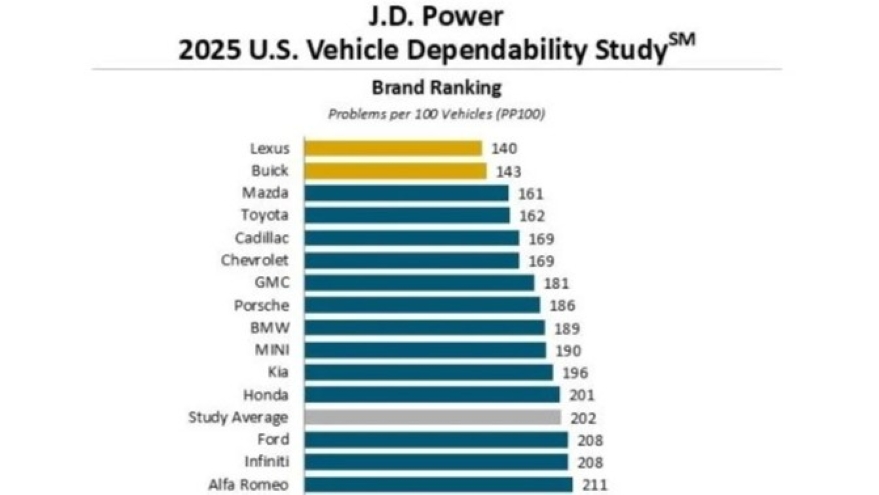Study finds 3-year vehicle dependability drops as COVID effects linger

Image courtesy of J.D. Power.
By subscribing, you agree to receive communications from Auto Remarketing and our partners in accordance with our Privacy Policy. We may share your information with select partners and sponsors who may contact you about their products and services. You may unsubscribe at any time.
Three-year-old cars have become less reliable than at any time in more than 15 years, according to the latest data from J.D. Power.
The research firm’s 2025 U.S. Vehicle Dependability Study found vehicle problems after three years of ownership have reached their highest level since 2009, with the industry average of 202 problems per 100 vehicles representing a huge 6% jump from 2024’s 190 PP100.
The issues are most notable in mass-market brands, which showed an increase of 16 PP100, related in part to software defects.
J.D. Power said the rise in problems was not a surprise, as the company’s 2022 Initial Quality Study found problems early in the ownership period of 2022 model-year vehicles hit a record high. Three years later, those issues are still there.
J.D. Power director of auto benchmarking Jason Norton said the issues are in part attributable to the aftermath of the COVID pandemic.
“While the increase in problems this year may be a thorn in the side of automakers and owners, it’s important to remember that today’s three-year-old vehicles were built during a time when the industry was grappling with major disruptions,” he said. “Supply chain issues, record-high vehicle prices and personnel disruption in the wake of the pandemic were problematic.”
Subscribe to Auto Remarketing to stay informed and stay ahead.
By subscribing, you agree to receive communications from Auto Remarketing and our partners in accordance with our Privacy Policy. We may share your information with select partners and sponsors who may contact you about their products and services. You may unsubscribe at any time.
The 36th annual study, based on responses from 34,175 original owners of 2022 model-year vehicles from August through November 2024, assesses 184 specific problem areas in nine categories: climate, driving assistance, driving experience, exterior, features/controls/displays, infotainment, interior, powertrain and seats.
Among the findings:
Software defects increase: Android Auto and Apple CarPlay connectivity was the most reported problem for the second consecutive year, rising from 6.3 PP100 last year to 8.4 – a 33% increase. Built-in Bluetooth systems (4.6 PP100) and wi-fi (2.4 PP100) were also among the top problems re. J.D. Power analysts said software issues still represent just 9% of all vehicle problems, but are gaining importance as vehicles become more software-reliant.
Integration issues: Five of the top 10 problems industrywide are related to smartphone integration, usage or connectivity. Over-the-air updates allow automakers to update software, but while 36% of owners said they had OTA on their vehicle during the first three years of ownership, just 30% said they noticed improvement after the update.
EVs improve, PHEVs hit bottom: Battery electric vehicles improved by 33 PP100 year-over-year to 223 PP100, while plug-in hybrids were the most problem-prone of all vehicle fuel types with 242 PP100, up by 26. Hybrid vehicles had the fewest problems with 199 PP100), followed by gas-powered vehicles (200 PP100).
New model struggles: Of the 27 new models that launched in the 2022 model year, only four performed better than their segment average for dependability. New models launched in 2022 averaged 241 PP100 in the 2025 study, compared to 196 for carryover models.
Top brands: Lexus ranked No. 1 overall in vehicle dependability for the third consecutive year with 140 PP100, followed by Buick (143 PP100), Mazda (161 PP100), Toyota (162 PP100) and Cadillac (169 PP100).
The Toyota Avalon led all models, one of six Toyota Motor Company models to lead its segment, joining the Lexus GX, Toyota Camry, Toyota Corolla, Toyota RAV4, Toyota Sienna and Toyota Tacoma. General Motors also took six model-level awards with the Cadillac XT6, Chevrolet Corvette, Chevrolet Silverado, Chevrolet Silverado HD, Chevrolet Tahoe and GMC Acadia.
The model ranking chart can be found here.


